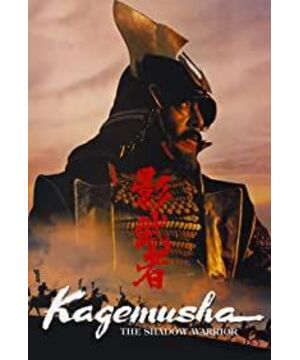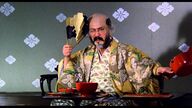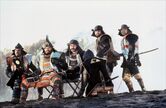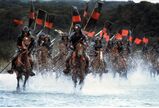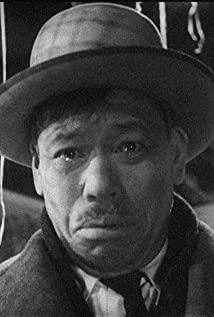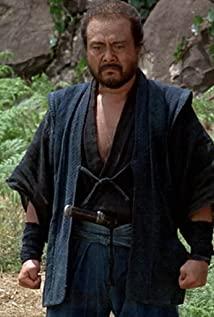A surprising picture appeared in Chizi. Three warriors who looked exactly the same appeared in a frame at the same time, which immediately aroused the curiosity of the audience. Takeda Shingen's younger brother saves a thief from execution to become his brother's shadow samurai. Although the thief looks exactly like Xinxuan, but Xinxuan said "How can a villain be my shadow warrior" to veto him. At this time, the thief laughed and talked about the principle of "those who steal the hook will be punished, and those who steal the country will be held back". , mocking that Shingen is also a thief at heart. Instead of being irritated by the thief's rude behavior, Xinxuan praised him for being outspoken and useful. A few simple lines of dialogue and a few subtle actions explain the characters and backgrounds of the main characters. This technique is much more interesting than those movies that read a long narration at the very beginning.
The first scene can be selected into the film textbook. The music sounded, a soldier ran into the picture, and the camera followed the soldier through the army constantly. As the rhythm of the music changes faster and faster, the atmosphere becomes more and more tense, and finally reaches a climax at the guards, and the music stops abruptly when the signal soldiers kneel. This scene is very particular about the scene scheduling and editing, which is impressive.
Takeda Shingen was attacked by the enemy's musketeers. When he was critically ill, he asked his retainers to conceal the news of his death for three years, in order to deter the enemy and keep the Takeda family's business. The thief his brother rescued at the execution ground became Shingen's shadow warrior. In order to keep the secret better, the retainer hid the truth from both Shadow and Shingen's family. In an accident, Shadow discovers the truth that Shingen has died. "The deity is gone, what's the point of the shadow's existence?" The deceived shadow was disheartened and unwilling to be their puppet again. It is useless for the retainers to do both hard and soft, and he can only leave. The turning point of the movie's plot happened when the courtiers sank the urn containing Xinxuan's body into the bottom of the lake. When the thief saw that the news of Shingen's death was about to be exposed, and the Takeda family was about to perish, he suddenly realized that the world was in chaos, and Takeda Shingen stood up not for his own interests, but to end the situation where life was ruined. His selfless spirit cannot be compared with a thief. At this time, the thief's values changed, from selfishness to selfless dedication. Only at this point did he truly recognize the identity of the shadow warrior, and he devoted himself to serving the Takeda family from then on. In the middle of the film, when Shadow and the protagonist's concubine finished their meal and came out, the camera was aimed at the shadow of the shadow, and this shot also echoed the shadow of Xinxuan in Zhizi. It turned out that all the heroes of that era were just ants who lived in the shadow of Takeda Shingen. With his shadow, Xin Xuanguang can make the enemy's army flee. This story is like the Japanese version of "Dead Zhuge scare away the living Zhongda". Playing for a long time, I will even believe it myself. The shadow protagonist is getting more and more into the state. In order to perform in front of his grandson Takemaru, he rides on Shingen's mount. Ironically, the shadow deceived everyone, but not one horse. He fell off the horse and his identity was exposed. He was dismissed by the Takeda family and left sadly. The shadow who got along with Takemaru day and night has regarded him as his grandson. When he left, he still wanted to see Takemaru, but was chased away by the servants of the Takeda family by throwing stones. This scene is really chilling. Once he is a thief, he will be cast aside for the rest of his life. Being the lord is just a dream of Nanke. The most beautiful dream wakes up and is the most lost. In the final scene, Shingen's son Katsurai becomes the lord and starts a war against the enemy. The Takeda Army, known as "moving like a mountain", has moved, and this also means that the Takeda family will perish. The plot arranged by Akira Kurosawa is also about the law of causality. I turned around and read it again, only to realize that Shenglai's motive for launching the war was actually hidden in the previous military meeting. The shadow humiliated Shenglai in public, and it was at that time that the seeds of Shenglai's revenge were planted. A war was launched to prove himself out of his father's shadow. At that time, a retainer said that the shadow is clever and easy to be mistaken by wisdom, which has already hinted at the following plot. Do you choose to live in humiliation or die fearlessly? A samurai would always choose the latter. After the three retainers said goodbye to each other, they led the Fenghuo Forest Army to launch a suicide charge against the enemy, and then fell into the hail of bullets from the enemy. Akira Kurosawa used a long space to express the tragic situation after the defeat of the Takeda Army, the flag was damaged, the horses whined, and the soldiers fell to the ground... In the background music of the horns and gongs, these fearless warriors played a tragic chapter. Psalms of the Times. The flag of Fenghuo Linshan, which once stood firm by Takeda Shingen, also sank to the bottom with the shadow warriors, declaring the end of an era. The changes of the times are closely related to personal destiny. Akira Kurosawa filmed the fate of shadows on the surface, but secretly elevates the film to the level of history, and the pattern is very large. Finally, I quote the end of the lyrics and music sung by Oda Nobunaga in the movie: "Life is fifty years in the world, and the world is a moment. It is like a dream, and it is a fantasy. The living is impermanent, and it must be exhausted." The warrior played a tragic and solemn poem of the times. The flag of Fenghuo Linshan, which once stood firm by Takeda Shingen, also sank to the bottom with the shadow warriors, declaring the end of an era. The changes of the times are closely related to personal destiny. Akira Kurosawa filmed the fate of shadows on the surface, but secretly elevates the film to the level of history, and the pattern is very large. Finally, I quote the end of the lyrics and music sung by Oda Nobunaga in the movie: "Life is fifty years in the world, and the world is a moment. It is like a dream, and it is a fantasy. The living is impermanent, and it must be exhausted." The warrior played a tragic and solemn poem of the times. The flag of Fenghuo Linshan, which once stood firm by Takeda Shingen, also sank to the bottom with the shadow warriors, declaring the end of an era. The changes of the times are closely related to personal destiny. Akira Kurosawa filmed the fate of shadows on the surface, but secretly elevates the film to the level of history, and the pattern is very large. Finally, I quote the end of the lyrics and music sung by Oda Nobunaga in the movie: "Life is fifty years in the world, and the world is a moment. It is like a dream, and it is a fantasy. The living is impermanent, and it must be exhausted."
View more about Kagemusha reviews


